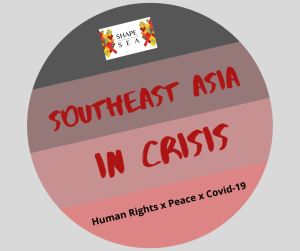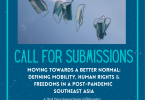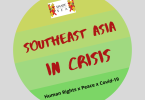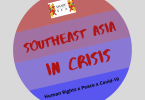Celso da FonsecaStudent, Asia Pacific MA Human Rights and DemocratisationGlobal Campus of Human Rights Asia PacificInstitute of Human Rights and Peace Studies, Mahidol University
 On 28 March 2020, the government of Timor-Leste declared a state emergency with the government decree-law No. 3/2020. This decree-law reveals a new model of social interaction because the state is emphasizing limiting people’s movement and promoting social distancing as the health procedure and mechanism of COVID-19 prevention.The implementation of the state emergency is being led by the prime minister with the national team of COVID-19 crisis management center called Centru Integradu Gestaun Crize (CIGC). Regardless of the task that they do, CIGC has regularly provided information on the case of COVID-19. It also includes people who are affected and suspected in the mandatory quarantine. The information on the COVID-19 outbreak is bringing a real opportunity for persons with disabilities because the information provided by CIGC through National Television (TVTL) adopted inclusive information and communication for persons with hearing impairment.Some disability rights defenders believe that COVID-19 outbreaks also have revealed an advantage to the persons with disabilities. Persons with hearing impairment are recognized. When CIGC provide information, sign language interpretation is included on the national television-TVTL. This situation indicates a new model of inclusive communication in the national information and communication sector even though in Timor-Leste, there is no national sign language developed by the ministry of education and sport (The Dili Weekly. 25 June 2019). However, there is a sign language program provided by the local NGO, AGAPE-school of sign language in Dili (ADTL, 2016).The national statistics of Timor-Leste (2015) reported that there are around 38,000 persons with disabilities in Timor-Leste with all types of disabilities. And there are 12,583 persons with hearing impairments. And from that number, approximately 2.386 people are categorized as students from pre-school to university level.One of the coordinators from the Disability Association of Timor-Leste ADTL highlighted that “it is the first time in the history of Timor-Leste that the government used sign language in the national television.” (Anonymous, 14 April 2020). It is one of the success stories for disabled organizations ”especially advocating the right of persons with hearing impairment to gain access to information based on equality and non-discriminatory services in Timor-Leste.Furthermore, as noted from an interview with a representative of the Disable Person Organizations (DPO), using sign language on the national television programs is great for an inclusive communication. It is also generating a new advocacy step that must be continuously improved and developed at the other policy levels. In fact, he highlighted that his organization, DPO, have been advocating sign language since 2004. However, the minister of education and sport in Timor-Leste still had not developed a national sign language in Timor-Leste. This is the reason why sign language has not been used at the distance learning program by the ministry of education and sport. But this is the right moment to have such a new development of sign language in Timor-Leste (Anonymous, 17 April 2020).Overall, COVID-19 has created an opportunity for advocating for including sign language in the national news on television. The situation of the COVID-19 outbreak made it happen for sign language recognition. This is the first step; it can be an excellent opportunity for scaling-up the inclusive program. This importunity also provides a positive step for future inclusion of people with disabilities in communication through television.But more importantly, this situation opens a new opportunity as a lesson learned for Timorese people about the inclusive program. It also creates a lesson of how the right of persons with disabilities must be promoted with an inclusive model. The rights of persons with disabilities need to be taken into account. And it is important to note that the advocacy process has been reaching into the government level. The commitment of the government to respect, guarantee, and fulfill the rights of persons with disabilities can be started now. It should be taking better steps towards a more inclusive Timor-Leste society.REFERENCES:Anonymous (14-17 April 2020). Personal Interview.Anonymous (17 April 2020). Personal Interview.ADTL (2016), Submission from Member Organizations of the Association for Disability Timor-Leste: The 26 the Session of the Human Rights Council Universal Periodic Review Working Group Recommendations. Dili, 2016. <https://www.laohamutuk.org/Justice/UPR/2016/ADTLUPRApr2016.pdf > Accessed on 18 April 2020.Aktualizasaun Informasaun Prevensaun Covid-19 Ho Ms (April 2, 2020) Available at <https://www.youtube.com/watch?v=koapE2aXYbQ> Accessed on 15 April 2020National of Statistic of Timor-Leste (2015). <http://www.statistics.gov.tl/pt/category/publications/census-publications/2015-census-publications/> Accessed on 18 April 2020.The Dili Weekly (25 June 2019) Governo Sei Inklui Lian Jestual Tetun Iha Eskola Publiku <https://www.thediliweekly.com/tl/notisias/17127-governo-sei-inklui-lian-jestual-tetun-iha-eskola-publiku> Accessed on 18 April 2020.Tatoli (April, 3 March, 2020). Eufrazia de Menezes Tradutora Lian Jestual ba Ema ho Defisiensia. <http://www.tatoli.tl/2020/04/03/eufrazia-de-menezes-tradutora-lian-jestual-ba-ema-ho-defisiensia/> Accessed on 18 April 2020.
On 28 March 2020, the government of Timor-Leste declared a state emergency with the government decree-law No. 3/2020. This decree-law reveals a new model of social interaction because the state is emphasizing limiting people’s movement and promoting social distancing as the health procedure and mechanism of COVID-19 prevention.The implementation of the state emergency is being led by the prime minister with the national team of COVID-19 crisis management center called Centru Integradu Gestaun Crize (CIGC). Regardless of the task that they do, CIGC has regularly provided information on the case of COVID-19. It also includes people who are affected and suspected in the mandatory quarantine. The information on the COVID-19 outbreak is bringing a real opportunity for persons with disabilities because the information provided by CIGC through National Television (TVTL) adopted inclusive information and communication for persons with hearing impairment.Some disability rights defenders believe that COVID-19 outbreaks also have revealed an advantage to the persons with disabilities. Persons with hearing impairment are recognized. When CIGC provide information, sign language interpretation is included on the national television-TVTL. This situation indicates a new model of inclusive communication in the national information and communication sector even though in Timor-Leste, there is no national sign language developed by the ministry of education and sport (The Dili Weekly. 25 June 2019). However, there is a sign language program provided by the local NGO, AGAPE-school of sign language in Dili (ADTL, 2016).The national statistics of Timor-Leste (2015) reported that there are around 38,000 persons with disabilities in Timor-Leste with all types of disabilities. And there are 12,583 persons with hearing impairments. And from that number, approximately 2.386 people are categorized as students from pre-school to university level.One of the coordinators from the Disability Association of Timor-Leste ADTL highlighted that “it is the first time in the history of Timor-Leste that the government used sign language in the national television.” (Anonymous, 14 April 2020). It is one of the success stories for disabled organizations ”especially advocating the right of persons with hearing impairment to gain access to information based on equality and non-discriminatory services in Timor-Leste.Furthermore, as noted from an interview with a representative of the Disable Person Organizations (DPO), using sign language on the national television programs is great for an inclusive communication. It is also generating a new advocacy step that must be continuously improved and developed at the other policy levels. In fact, he highlighted that his organization, DPO, have been advocating sign language since 2004. However, the minister of education and sport in Timor-Leste still had not developed a national sign language in Timor-Leste. This is the reason why sign language has not been used at the distance learning program by the ministry of education and sport. But this is the right moment to have such a new development of sign language in Timor-Leste (Anonymous, 17 April 2020).Overall, COVID-19 has created an opportunity for advocating for including sign language in the national news on television. The situation of the COVID-19 outbreak made it happen for sign language recognition. This is the first step; it can be an excellent opportunity for scaling-up the inclusive program. This importunity also provides a positive step for future inclusion of people with disabilities in communication through television.But more importantly, this situation opens a new opportunity as a lesson learned for Timorese people about the inclusive program. It also creates a lesson of how the right of persons with disabilities must be promoted with an inclusive model. The rights of persons with disabilities need to be taken into account. And it is important to note that the advocacy process has been reaching into the government level. The commitment of the government to respect, guarantee, and fulfill the rights of persons with disabilities can be started now. It should be taking better steps towards a more inclusive Timor-Leste society.REFERENCES:Anonymous (14-17 April 2020). Personal Interview.Anonymous (17 April 2020). Personal Interview.ADTL (2016), Submission from Member Organizations of the Association for Disability Timor-Leste: The 26 the Session of the Human Rights Council Universal Periodic Review Working Group Recommendations. Dili, 2016. <https://www.laohamutuk.org/Justice/UPR/2016/ADTLUPRApr2016.pdf > Accessed on 18 April 2020.Aktualizasaun Informasaun Prevensaun Covid-19 Ho Ms (April 2, 2020) Available at <https://www.youtube.com/watch?v=koapE2aXYbQ> Accessed on 15 April 2020National of Statistic of Timor-Leste (2015). <http://www.statistics.gov.tl/pt/category/publications/census-publications/2015-census-publications/> Accessed on 18 April 2020.The Dili Weekly (25 June 2019) Governo Sei Inklui Lian Jestual Tetun Iha Eskola Publiku <https://www.thediliweekly.com/tl/notisias/17127-governo-sei-inklui-lian-jestual-tetun-iha-eskola-publiku> Accessed on 18 April 2020.Tatoli (April, 3 March, 2020). Eufrazia de Menezes Tradutora Lian Jestual ba Ema ho Defisiensia. <http://www.tatoli.tl/2020/04/03/eufrazia-de-menezes-tradutora-lian-jestual-ba-ema-ho-defisiensia/> Accessed on 18 April 2020.





